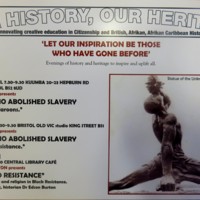
Our History, Our Heritage
Our History, Our Heritage was a black-led Bristol group promoting historical awareness of the contributions of African, African-Caribbean and British peoples in past and present struggles, and in Bristol in particular. Their series of talks and educational initiatives sought to encourage 'creative education in Citizenship and British, Afrikan, Afrikan Caribbean History', taking inspiration from 'those who have gone before'.
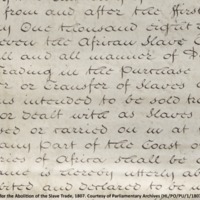
Ireland and the Slave Trade
The Ulster's People's College and the South Belfast Roundtable on Racism launched an exhibition to mark the bicentenary at a Northern Ireland Committee for Refugees and Asylum Seekers (NICRAS) conference on slavery at the Linen Hall Library in 2007. A study group of community workers from NICRAS, the Chinese Welfare Association, Black Youth Network, Donegall Pass Community Forum and the Donegall Pass Community Centre produced the exhibition which told the story of Ireland's involvement in the slave trade and its abolition. Attention was drawn to the fact that merchants in Belfast and across Ireland profited by supplying slave plantations with provisions such as beef or salted fish; some owned slave plantations. The exhibition also stressed that a growing number of campaigners often fought both for Catholic Emancipation and the Abolition of Slavery, linking the two experiences of disadvantage. The exhibition also raised the issues of contemporary slavery and racism. The exhibition toured community centres in Northern Ireland.
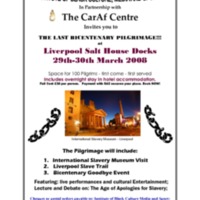
Last Bicentenary Pilgrimage
The ‘Last Bicentenary Pilgrimage’ trip to Liverpool was organised by the Institute of Black Culture Media and Sport, in partnership with the CarAf Centre, who provide educational, social and cultural activities for disadvantaged parents and young people. Members of the local Camden community were taken on a two-day family learning trip to Liverpool, to mark the end of the bicentenary with a goodbye ceremonial event and a visit to the International Slavery Museum. The event was supported by the London Borough of Camden Council.
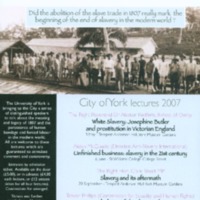
Slavery and Anti-Slavery in the Modern World
The City of York lectures in 2007 examined the question: Did the abolition of the slave trade in 1807 really mark the beginning of the end of slavery in the modern world? The University of York organised the public lecture series, which discussed the meaning and legacy of 1807 and the persistence of human bondage and forced labour in the modern world. Speakers included the Right Reverend Dr Alastair Redfern (Bishop of Derby), Aidan McQuade (Director, Anti-Slavery International), Clare Short MP and Trevor Phillips (Commission for Equality and Human Rights).
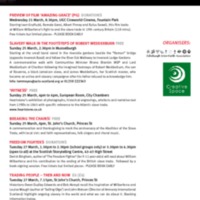
Marking the 200th anniversary of the Abolition of the Slave Trade
A programme of events to mark the bicentenary was organised by Edinburgh Inter-Faith Association. This included a slavery walk in the footsteps of Robert Wedderburn, a commemoration and thanksgiving service at St John's Church in Edinburgh, and a debate and discussion on the theme 'Trading People - Then and Now'.
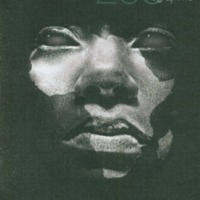
2007 Bicentenary for the Abolition of the Slave Trade Act at the National Maritime Museum
The National Maritime Museum marked the bicentenary with a range of initiatives and events including a new exhibition, a film season, poetry, music, debates, and new publications. A new permanent gallery opened at the museum in winter 2007 exploring Britain's Atlantic empire. A catalogue of slavery-related images, artefacts and documents from the collections of the museum, 'Representing Slavery', was published. The museum also devised a transatlantic slavery trail around Greenwich.
The National Maritime Museum hosted a number of events throughout 2007. The theme of the weekend 23-25 March was 'And still I rise', marked with a series of activities, performances and discussion. On August 23, International Day for the Remembrance of the Slave Trade and its Abolition, the ‘Freedom Festival: Contemporary Commemoration’ event saw a programme of creative events and performances exploring themes around the heritage of enslavement. The museum also offered a range of learning experiences based on its collections. For example, in November, a study session, 'Roots of Resistance: Abolition 1807' examined the roots of resistance and the abolition movement through talks by curators and contemporary artists. Activities for families were based on themes of freedom and carnival. 'The Big Conversation 2007' was a programme of debate and showcasing of diverse projects undertaken by students around the country, organised by the Understanding Slavery Initiative and the Department for Children, Schools and Families.
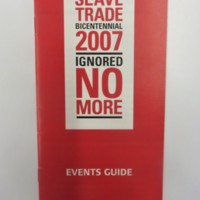
Abolition of the Slave Trade Bicentennial 2007: Ignored No More
The Greater London Authority produced an Events Guide for Londoners in 2007 detailing some of the initiatives taking place in the capital involving the Mayor. This included Africa Day on Trafalgar Square, celebrating the positive contributions of London's African communities, and 'Rise: London United', an anti-racist music festival. The conference 'Faith Symposium: In God's Name?' at City Hall examined the role of the Church in the transatlantic slave trade. There was also a seminar on the legacies of the transatlantic slave trade from a Caribbean perspective and a Caribbean Publishers Book Fair held at London Metropolitan University. The Dr Eric E. Williams Memorial Lecture Series at City Hall was made available as a webcast.
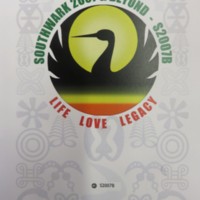
Southwark 2007 & Beyond (S2007B)
The Southwark 2007 & Beyond Steering Group was established to correct perceived misinformation about Britain's role in perpetuating slavery, and to promote education and dialogue on anti-slavery resistance and human rights. The Steering Committee was composed of representatives from Southwark's Afrikan, Afrikan Caribbean and Afro-descendant communities, and the year-long programme of events was funded by Southwark Council. August 2007 was a key month of the commemorative programme, focused on 23 August, the United Nations International Day for Remembrance of the Slave Trade and its Abolition, and the anniversary of the beginning of the Haitian Revolution. A 'Vigil of Remembrance, Resistance and Repairs' included speakers, performances and a libation ceremony. Other events included 'A Bicentennial Dialogue' featuring a keynote address by Dr Joy DeGruy-Leary. The publication 'Abeng Soundings: Abolitionist Landmarks of our Freedom March', co-authored by Esther Stanford of Rendezvous of Victory, provided an overview of the resistance efforts of African freedom fighters against slavery.
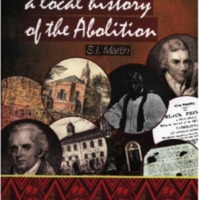
Lambeth and the Abolition
The Lambeth and the Abolition programme included debates, historic trails, a video conferencing discussion between people in Brixton, Ghana and Jamaica, Caribbean family history classes, creative writing workshops, and a dedicated series of events within Black History Month. ‘The Runaways’, an original drama about a runaway slave boy and a kitchen maid in London in 1700, was performed in Lambeth primary schools, accompanied by a workshop. The project researched the local historical links to abolition, and famously the activities of the Clapham Sect (William Wilberforce and his associates) who attended Holy Trinity Church in Clapham. A booklet by historian S. I. Martin sets the history of abolition in the larger context, through his study of the African Academy at Clapham, and his mapping of some of the links between Lambeth, Jamaica and West Africa at the beginning of the 19th century.
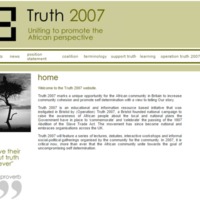
Truth 2007: Uniting to promote the African perspective
Truth 2007 was an educational and information resource-based initiative that was instigated in Bristol by (Operation) Truth 2007 led by Jendayi Serwah. It became a national coalition of UK-based Pan-African organisations which aimed to raise the awareness of the African perspective on local and national government plans to mark the bicentenary. Truth 2007 featured a series of lectures, debates, interactive workshops and informal social-political gatherings organised by community groups. The Truth 2007 coalition expressed dissatisfaction with much of the terminology and focus of the 'official' commemorations.
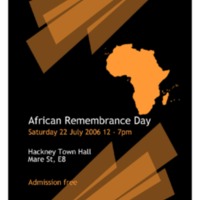
The Ligali organisation, 2007
Ligali is a Pan-African human rights organisation that challenges the misrepresentation of African people, culture and history in the British media. It produced various responses to promote the African perspective of the 2007 bicentenary, including their 'Declaration of Protest to the 2007 Commemoration' expressing dissatisfaction with much of the terminology and focus of the 'official' commemorations. Their particular focus was on the ‘Maafa’, derived from the Kiswahili word meaning ‘great disaster’, and referring to the ongoing impact of enslavement and colonialism for African peoples. The publication ‘Addressing Maafa denial and slavery apologists’ was a guide to promoting the truth about the Maafa from an Africentric position.
‘Maafa: Truth 2007’ is a documentary film directed by the Ligali founder, Toyin Agbetu, and produced by Ligali’s then head of media affairs, emma pierre. The film confronts some of the myths about British slavery, featuring contributions from community activists, project workers, teachers and the African British business community. The film was screened at various events, including African Remembrance Day at Hackney Town Hall in 2006. Ligali’s ‘Freedom Fighter’ stamps were designed by Emma Pierre-Joseph as a response to the Royal Mail’s publication of six stamps to mark the bicentenary. ‘The Walk’ is a documentary record of Toyin Agbetu’s protests at the service at Westminster Abbey to mark the bicentenary on 27 March 2007.
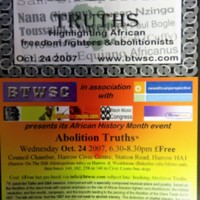
Abolition Truths
Abolition Truths was a panel-led talk and Q&A session at Harrow Civic Centre in October 2007, led by a creative arts community group Beyond the Will Smith Challenge (BTWSC). The event had a particular emphasis on the role of African freedom fighters and abolitionists, the Haitian Revolution, and the revolts, campaigns and boycotts leading to the passing of the 1807 Act. The event was interspersed with music and poetry, including a musical piece 'Then to Now' performed by Africanus Britanicus, and featuring HKB Finn & Co, which told the story of slavery and its legacy across the African diaspora. Teenage poet Stefan Testsola performed a poem on the theme of abolition. There was also a presentation of the Professor Allotey Science Prize, awarded to Harrow students of African descent.
Other BTWSC events in November 2007 included a discussion session with Ms Serwah, 'Putting the Abolition & Slavery Into Perspective' at Willesden Green Library, presented in association with Brent Black History Brent Library. 'From The Talking Drums to Rap & Grime' at Tavistock Hall in Harlesden commemorated the Abolition Act through narration and a musical concert.
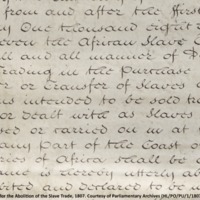
BOUND
Curated by Predrag Pajdic, BOUND was an exhibition of works by international contemporary artists representing personal perspectives on the physical and psychological impact of slavery on humanity, in historical and modern contexts. BOUND incorporated archival material, conceptual work, photography, video, live art performance, interventions and installations. It was a partnership project between the Open Eye Gallery, FACT (Foundation for Art and Creative Technology) and Tate Liverpool. The exhibition opened at Open Eye Gallery and then ran at various venues across Liverpool. Associated events included open table discussions, talks and film screenings.
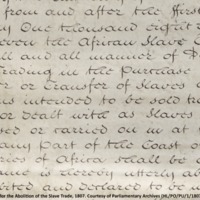
1807: Blake, Slavery and the Radical Mind
A special display at Tate Britain to mark the bicentenary focused on William Blake and the circle of radical writers and artists associated with the publisher Joseph Johnson in the 1790s and 1800s. Blake's poetry and art protested against mental, physical and economic enslavement and inspired generations of artists, writers and political dissenters. The display was accompanied by a variety of events, including talks, performances and music for adults, families and young people and schools.
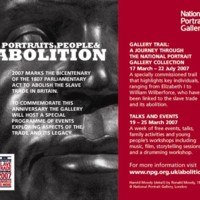
Portraits, People and Abolition
The National Portrait Gallery created a new gallery trail to mark the bicentenary, written by Dr Caroline Bressey. The trail highlighted portraits of key individuals, ranging from Elizabeth I to William Wilberforce, linked to the slave trade and its abolition. Portraits included those who invested in the trade, or who owned slaves and supported slavery, as well as images of enslaved people themselves and of people who were prominent in the movement to abolish the trade. The trail ended with a series of contemporary portraits of individuals involved in preventing slavery today. A week of talks, music, film and family activities included a discussion of the painting 'The Anti-Slavery Convention, 1840' by Benjamin Robert Haydon.
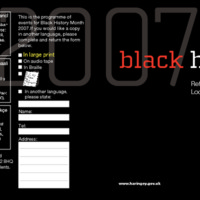
Haringey Council Black History Month
In consultation with the Black community in Haringey, the programme for Black History Month 2007 included many events to commemorate the bicentenary of the Abolition Act. Several took place at the Marcus Garvey Library in Tottenham, including poetry writing workshops, African drumming and dance workshops, and an exhibition and presentations led by Anti-Slavery International. There were several events to mark the bicentenary, including by Bedale House Supported Housing Scheme (featuring tenants' video diaries, a short film, poetry and guest speakers) and by Efiba Arts, supported by The Bridge New Deal for Communities. Haringey Council ran a poetry competition on the theme of slavery for young people aged 13-15. The winning entries were published in a pamphlet distributed to schools and libraries in the borough. Historian S. I. Martin led a guided tour of Haringey's places relating to the abolition of the slave trade. There was also a series of seminars by Robin Walker addressing 'Transatlantic Enslavement: What really happened?'.
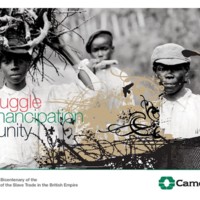
Struggle, Emancipation and Unity
The year-long programme of commemorative events from Camden Council was put together in consultation with the 1807-2007 Taskforce of local African and Caribbean community leaders. The key to these events was remembering slavery through the resistance of Africans, their celebration in their liberation and their unity in tackling present-day inequalities. Camden’s 18th and 19th Century Slavery Trail was created around the area. In eight stops, it explored the lives of men and women connected to the slave trade who lived and worked in the London Borough of Camden. The Resistance Film Season, in partnership with the British Museum, explored the legacy of the slave trade through a mixture of contemporary and classic films. Other events also included local exhibitions, poetry readings, debates and talks.
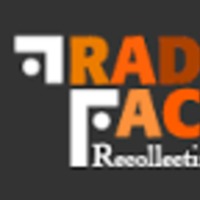
Trading Faces: Recollecting Slavery
Trading Faces: Recollecting Slavery was a consortium project developed by Future Histories (a non-profit organisation set up to maintain archives of African, Caribbean and Asian performing arts in the UK), Talawa Theatre Company (a leading Black-led touring theatre company) and V&A Theatre Collections. Trading Faces made use of archive documents, video and audio material to explore the legacy of the transatlantic slave trade in British performing arts and society. By promoting the use of primary resources, the online exhibition aimed to stimulate creativity, critical thinking, individual responsibility and participation. Highlights of the exhibition included a performance timeline featuring recently archived material from the past 200 years, narratives of slavery from both the past and present and a series of virtual rooms, which explored ritual, religion, carnival and masquerade amongst other aesthetic themes. On the Open Doors section of the site, users contributed material and ideas to promote a critical debate on the subject. As part of the project, the 'Retrace: Identity and Heritage' educational resource pack from Talawa Theatre Company is about the exchange of culture between the UK and other countries linked by the transatlantic slave trade and colonialism, and the impact of these relationships on the performing arts.
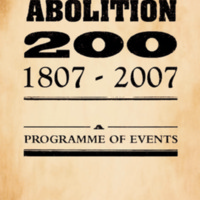
Abolition 200
A programme of events from Wolverhampton City Council to mark the bicentenary, which included a public debate about whether the British government should apologise for the slave trade, services of remembrance and film screenings. Other highlights included stories from Wolverhampton City Archives about the city's role in sustaining the slave trade, and abolishing it, and a discussion and writing workshop with the black writer Fred D'Aguiar and members of Wolverhampton's Black Readers and Writers group. 'Our Ancestors, Our Heritage, Our Stories' was a showcase event highlighting the work of the African Caribbean Community Panel.
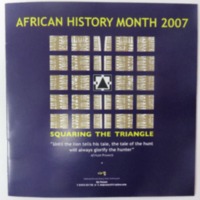
African History Month 2007: Squaring the Triangle
Squaring the Triangle was the theme of African History Month 2007 in Suffolk. The programme was co-ordinated by the Nia Project (a cultural, arts and heritage project) and explored the history and legacy of slavery through film, literature, exhibition, music and debate. The theme of Squaring the Triangle was underpinned by the African proverb, ‘Until the Lion tells his tale the tale of the hunt will always glorify the hunter’. Highlights included the Nia Memorial Lecture, given by the producer-director Pam Solomon-Fraser. Nubian Films short season looked at the current legacy of slavery and the Diaspora of African peoples. Talks, workshops and debates covered issues such as reparations, retribution, resistance, and educational guidelines for parents on how to discuss the African slave trade with children. Special recognition was given in the programme to Ghana’s 50th anniversary as an independent state. There were heritage walks around Ipswich to uncover some of the cultural connections with Africa, the Caribbean and Suffolk. A Youth Day Conference hosted by the Zimbabwe Youth brought together young people from the community to use music and poetry to explore their ideas on the legacy of the slave trade. Historian Maureen James and representatives from Suffolk County Council led pupils from local schools in researching the anti-slavery movements, with particular reference to the Clarkson family.